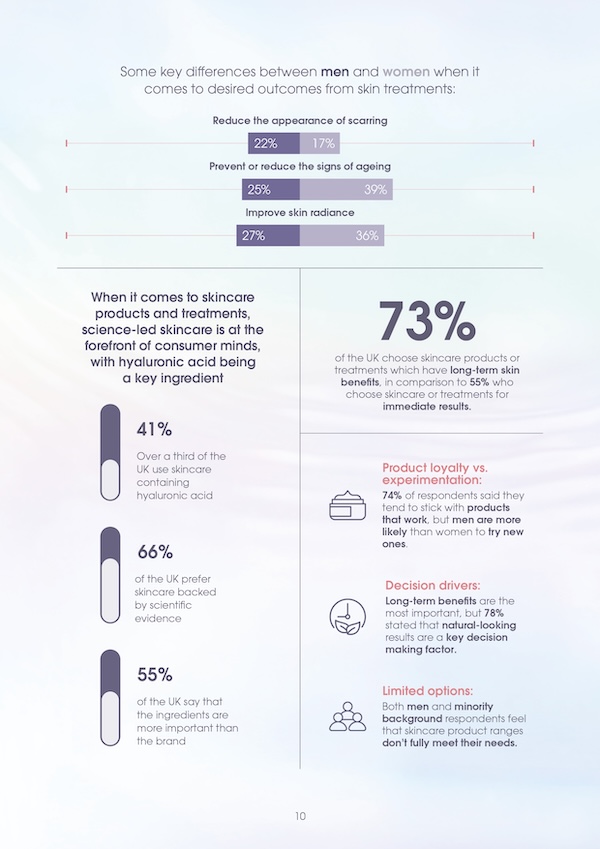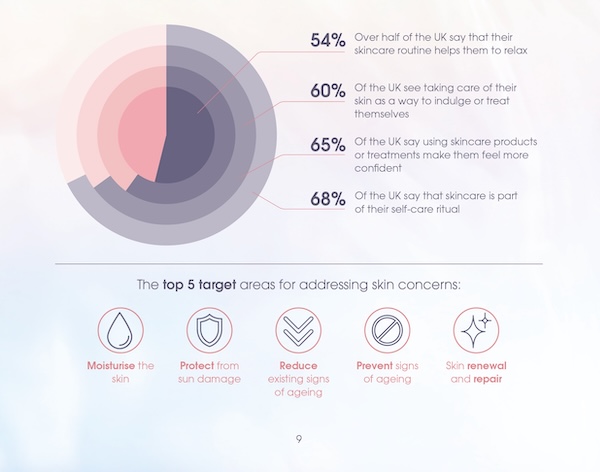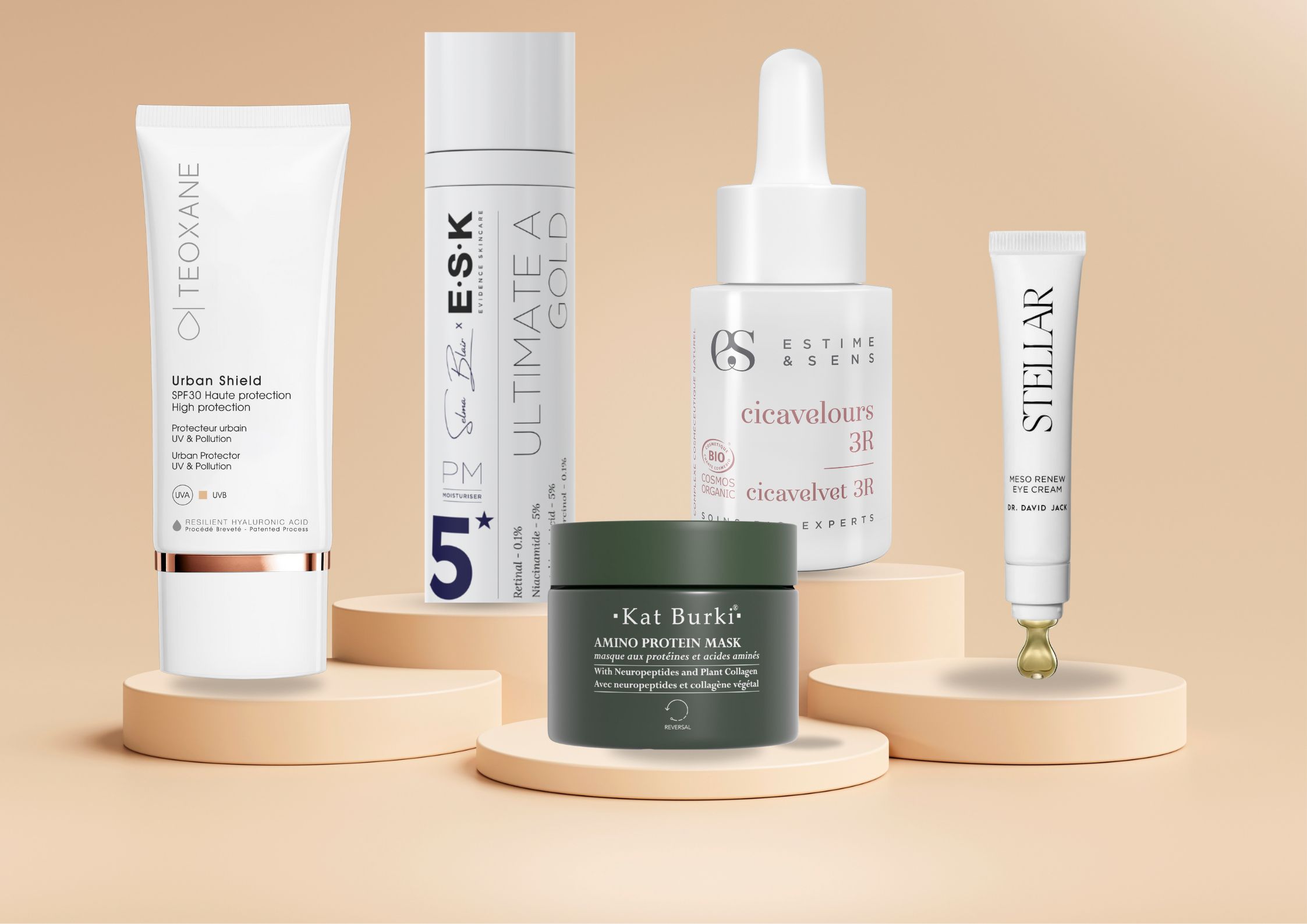A new report from Teoxane on skin quality found that of 2,157 women aged between 18-75 in the UK, 47% regularly suffer from stress, while only 43% feel they get enough sleep, which are some of the top factors that affect skin quality.
Sleep is important for cell turnover, collagen production, and blood flow for skin tone improvement. Whilst stress triggers hormonal changes that stimulate an increase in oil production, break down collagen and elastin, and slow down the skin’s ability to repair.
Others that can significantly impact patients' skin quality include diet, exercise, hygiene, smoking, vaping, and sun exposure.
“Skin quality” is not just about whether a patient has acne or wrinkles. It refers to the overall health and appearance of the skin. It’s about how it looks, feels, and functions. The skin’s texture, tone, hydration, firmness and barrier function.
The survey conducted by Norstat on behalf of the hyaluronic acid filler brand found that as well as stress and sleep being big issues for women in the UK, as is lack of exercise with 43% not doing enough to stay active.
Key findings from the report:
-
Almost half of women in the UK regularly suffer from stress (47%)
-
Less than half of the UK feel they get enough sleep and are refreshed the next day (43%)
-
Over a third of the UK don’t feel they do enough to keep physically active (43%)
-
Over half of the UK say that their skincare routine helps them to relax (54%)
-
Using skincare products or treatments makes women in the UK feel more confident (65%)
-
73% of the UK choose skincare products or treatments for long-term skin benefits, whereas 55% choose skincare or treatments for immediate results
-
74% of the UK stick to products they know work, but men are more likely than women to try new ones
-
55% of the UK say that the ingredients are more important than the brand
-
Over a third of the UK (41%) are using skincare containing hyaluronic acid
What are the best ingredients for improving skin quality?
Dr Rasha Rakhshani-Moghadam of Dr Rahsha Clinic recommends using a retinol at night to improve skin quality.
Retinol promotes cell turnover, helping to resurface the skin by shedding dead cells and stimulating new growth. This process can visibly smooth fine lines, reduce the appearance of wrinkles, improve uneven skin tone, and help clear clogged pores, making it beneficial for both ageing and acne-prone skin,” says Dr Rakhshani-Moghadam.
SPF is one of the most important components for improving and maintaining skin quality, she says. “UV radiation breaks down collagen and elastin, leading to fine lines, wrinkles, sagging, and rough texture. Daily use of SPF helps prevent this damage, preserving the skin’s firmness and smoothness.”
Hyaluronic Acid (HA) moisturisers are also recommended, especially those with a low molecular weight.
“Moisturisers, with low molecular weight HA and peptides, offer added benefits for skin quality,” adds Dr Rakhshani-Moghadam.
“Low-molecular-weight HA can penetrate deeper, binding to water within the skin and boosting hydration from within,’ she adds. “This helps to plump the skin, reduce the appearance of fine lines, and improve elasticity, making the skin look smoother and more supple. When peptides are applied topically, they can stimulate collagen production, support skin repair, and enhance firmness. Together, these ingredients work to reinforce the skin’s moisture barrier, reduce dehydration, and support long-term skin structure and resilience - which are essential factors for achieving glowing, healthy-looking skin.”
How do you test a patient’s skin quality?
Dr Rakhshani-Moghadam says that a gentle pinch test can help instantly identify the quality of a patient’s skin - if the patient has skin laxity, the skin will not bounce back.
“Even young people can have this, and crepey/thin skin lacks collagen and support.”
Who should focus on their skin quality?
Dr Rakhshani-Moghadam recommends that all patients can benefit from taking care of their skin quality, whether that is to prevent signs of ageing or target visible concerns.
“Generally, your mid-20s is when we start losing collagen, environmental damage is accumulating, and lifestyle choices such as diet, sleep, and skincare start to show up on the skin, and signs of ageing can become apparent,” she says.
“Starting early doesn’t mean using aggressive anti-ageing products; it’s more about prevention. Choose a daily SPF, gentle cleanser, basic hydration, occasional exfoliation and optional antioxidant. In your 30s and beyond, your routine can evolve to include actives like retinol, peptides, or more targeted treatments, as skin renewal slows and visible changes appear.”
Biologically, male skin tends to be thicker, oilier and more collagen dense, showing signs of ageing at a slower rate than women, but that doesn’t mean they shouldn’t be taking care of their skin quality, says Dr Rakhshani-Moghadam.
“Culturally, women have traditionally been more marketed to around skincare, so men may start caring later, but this is changing fast,” she says. “Skin quality is a universal health and confidence issue, not just a cosmetic one. Early, consistent care benefits all genders, and it’s never too late to start.”

The report found that the metric in which men were more concerned than women was in reducing the appearance of scarring with 22% of men stating that as a concern compared to 17% of women.
Women outweighed men significantly for wanting to prevent or reduce the signs of ageing and improve radiance.
Importantly, the report found that both men and minority background respondents feel that skincare product ranges don’t fully meet their needs.

A holistic approach to skin quality
There is more to glowing skin than external beauty; a holistic approach is necessary to improve patients’ overall skin quality. Skin quality is often linked to boosting self-esteem and maintaining a positive body image, with 65% of respondents saying that using skincare products or treatments makes them feel more confident. However, taking care of your skin goes beyond looking good, and over half (54%) of the UK shared that their skincare routine helps them to relax. Patients are more aware of how nutrition, stress management, and sleep affect skin quality, meaning they’re more likely to invest in a holistic approach to skincare.
Skin quality in focus - what does this mean for practitioners?
With skin quality starting to be more talked about and important to patients, practitioners have the opportunity to help holistically by recommending the right skincare, lifestyle changes and aesthetic treatments.
With the rise of dermal fillers and skin boosters, patients now have tools to actively improve skin quality beyond traditional skincare, and he availability of treatments that target skin quality is normalising the idea of treating skin as part of overall well-being.




